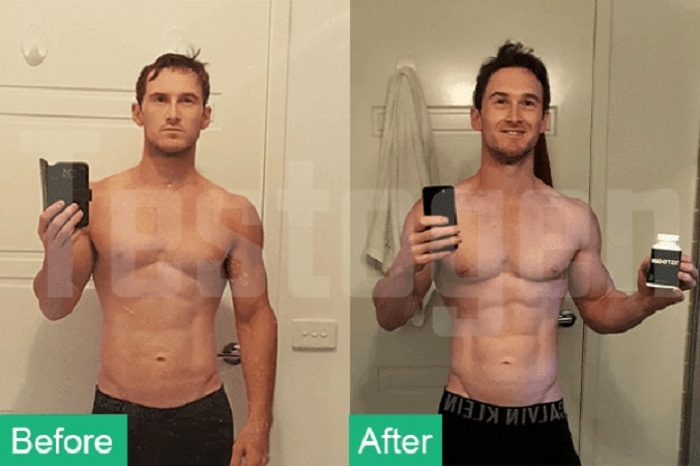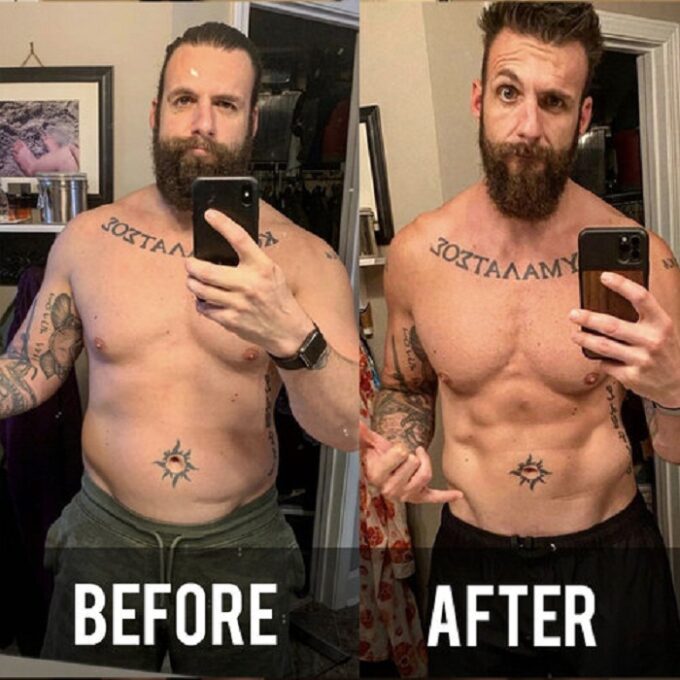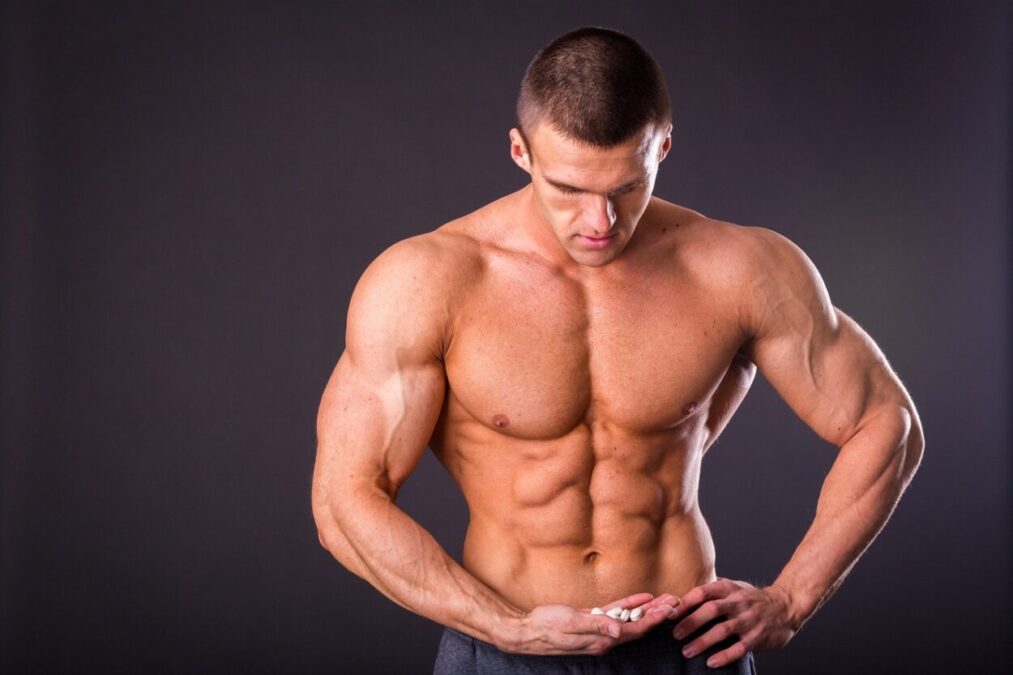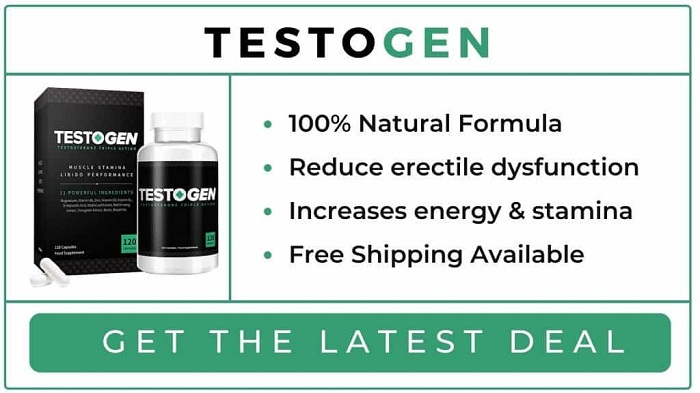Typically, when you hear someone talking about a testosterone cycle, it refers to cycling for cutting and bulking phases common with bodybuilders. Is the steroid in any form also cycled in testosterone replacement therapy (TRT) treatments overseen by a doctor?
What is a testosterone cycle, and why is it used? Before beginning any steroid, whether condoned and prescribed by a doctor or without a prescription (not recommended) for bodybuilding purposes, learn as much as you can about the hormone, its function, and safety.
Testosterone Cycle Example
Testosterone is a hormone produced in the male testes and in very small amounts by women’s ovaries. Normal levels of the male hormone in healthy adult males range anywhere from 300 ng per deciliter to 1000 ng per deciliter.
When a man is at the lower end and is experiencing symptoms of low testosterone (low T) such as low libido, erectile dysfunction, infertility, or hormonal imbalances that can affect the quality of life, TRT may be recommended.
Exogenous testosterone, meaning that which is delivered from outside of the body, is not recommended for bodybuilding or athletic enhancement due to its questionable benefits and potential side effects as well as increased risk of misuse and abuse.
It is a prescription-only drug and is classified as a Schedule III controlled substance.
Its main function is to provide secondary sex male characteristics in men, but the hormone goes way beyond a deeper voice, amount of body or facial hair, and libido or sex drive.
It is also an important aspect of many hormonal and metabolic functions in the body including ratios of lean muscle mass to fat and is vital for fertility. It can even influence the manufacture of red blood cells.
Testosterone Cycle Results

The testosterone cycle is a term that refers to an on-again, off-again usage of the hormone through injection solutions or topical application.
Some men believe TRT prescribed for medical reasons can use for a certain amount of time and then discontinue once hormone levels are up. Once a man starts on TRT for the treatment of hypogonadism (low T levels), that treatment must continue for life.
In cases where levels are low enough to impact the quality of life for fertility, the goal of treatment with hormone therapies is to consistently raise levels of tests in the body.
If the body isn’t doing it for you, exogenous testosterone can. Stopping the therapy will result in returning to the low T levels experienced before the therapy began.
For this reason, therapy is not recommended for everyone and is generally only recommended to men experiencing symptoms of low T.
Some of the symptoms of low T include:
- Hair loss
- Low sex drive
- Erectile dysfunction
- Depression
- Difficulty focusing and concentrating
- Decreased muscle mass
- Poor energy levels.
Testosterone Cycle For Beginners

Most doctors will not recommend TRT if you are not experiencing symptoms, even if your testosterone levels show abnormally low.
It should also be noted that even if a man starts TRT, it may be difficult to predict specific benefits based on individualized cases because everyone is different.
For some, energy levels are improved, as well as muscle mass and bone density. Others may or may not experience improved erection quality or enhanced libido.
Most men do comment that they perceive an improvement in their emotions and moods with TRT.
Testosterone cycling is most commonly associated with the nonprescription use of the steroid as a bodybuilding aid.
However, it should be noted that a man injecting or applying the drug when levels of the hormone in the body are already within an adequate range may increase his risk of experiencing side effects or adverse reactions.
Numerous bodybuilding websites on the Internet recommend different methods in regard to beginner, intermediate, and advanced levels of how to cycle with testosterone.
Many combine it with additional hormones, steroids, and other medications that reduce the risk of some side effects.
A cycle as recommended by a bodybuilding site, for example, will depend on the type being taken and its milligram strength.
In general, a male testosterone cycle dosage can range anywhere from eight to 10 weeks, though longer than 12 weeks is not recommended, even by many bodybuilders.
Dosages may be adjusted throughout that time period. When the drug is discontinued temporarily (often equating to the same amount of time that it was taken), other supplements or drugs are commonly used. After the ‘rest’ period, the injections begin again.
The testosterone cycle before and after results, depending on individual goals, can produce different and sometimes alarming results, especially when excessive amounts of the drug in combination with other anabolic steroids are used.
Remember that the results of using steroids for bodybuilding and competitions are only temporary. Once the drug is discontinued, muscle gains gradually disappear, no matter what type of cycle you’re following.
Information provided by: https://supplementoo.com/
References
- Meyer P. [Testosterone cycle in female hypoactive sexual desire disorder]. Rev Med Suisse. 2016 Mar 16;12(510):540-3. Review. French.
- Jordan K et al. The role of testosterone in sexuality and paraphilia–a neurobiological approach. Part I: testosterone and sexuality. J Sex Med. 2011 Nov;8(11):2993-3007. doi: 10.1111/j.1743-6109.2011.02394.x. Epub 2011 Aug 2. Review.
- Neto WK et al . Effects of testosterone on the lean mass gain in elderly men: a systematic review with meta-analysis of controlled and randomized studies. Age (Dordr). 2015 Feb;37(1):9742. DOI: 10.1007/s11357-014-9742-0. Epub 2015 Feb 1. Review.
- Rove KO et al . Role of testosterone in managing advanced prostate cancer. Urology. 2012 Oct;80(4):754-62. DOI: 10.1016/j.urology.2012.05.006. Epub 2012 Jul 13. Review.
- Kovac JR et al . Current state of practice regarding testosterone supplementation therapy in men with prostate cancer. Steroids. 2014 Nov;89:27-32. DOI: 10.1016/j.steroids.2014.07.004. Epub 2014 Jul 27. Review.
- Kovac JR et al . Testosterone supplementation therapy in the treatment of patients with metabolic syndrome. Postgrad Med. 2014 Nov;126(7):149-56. doi: 10.3810/pgm.2014.11.2843. Review. Erratum in: Postgrad Med. 2015 Jan;127(1):117. Kovac, Jason [corrected to Kovac, Jason R].
- Ullah MI et al . Transdermal testosterone replacement therapy in men. Drug Des Devel Ther. 2014 Jan 9;8:101-12. DOI: 10.2147/DDDT.S43475. eCollection 2014 Jan 9. Review.
- Pomara C et al . Neurotoxicity by synthetic androgen steroids: oxidative stress, apoptosis, and neuropathology: A review. Curr Neuropharmacol. 2015 Jan;13(1):132-45. doi: 10.2174/1570159X13666141210221434. Review.
- Valero Rosa J et al . [Current recommendations about the diagnosis and treatment of testosterone deficit syndrome: Clinical guidelines]. Arch Esp Urol. 2013 Sep;66(7):737-44. Review. Spanish.
- Douris N et al. Beta-adrenergic Receptors are Critical for Weight Loss but not for other Metabolic Adaptations to the Consumption of a Ketogenic Diet in Male Mice. Molecular Metabolism. 2017 Jun 6.
- Schänzer W. Metabolism of anabolic androgenic steroids. Clinical chemistry. 1996 Jul 1;42(7):1001-20.
- Schubert M et al. Osteoporosis in male hypogonadism: responses to androgen substitution differ among men with primary and secondary hypogonadism. Hormone Research in Paediatrics. 2003;60(1):21-8.
- Zgliczynski S et al. Effect of testosterone replacement therapy on lipids and lipoproteins in hypogonadal and elderly men. Atherosclerosis. 1996 Mar 1;121(1):35-43.
- Shapiro J et al. Testosterone and other anabolic steroids as cardiovascular drugs. American journal of therapeutics. 1999 May 1;6(3):167-74.
- Zitzmann M et al. Prostate volume and growth in testosterone-substituted hypogonadal men are dependent on the CAG repeat polymorphism of the androgen receptor gene: a longitudinal pharmacogenetic study. The Journal of Clinical Endocrinology & Metabolism. 2003 May 1;88(5):2049-54.
- Bhasin S et al. Testosterone dose-response relationships in healthy young men. American Journal of Physiology-Endocrinology And Metabolism. 2001 Dec 1;281(6): E1172-81.

